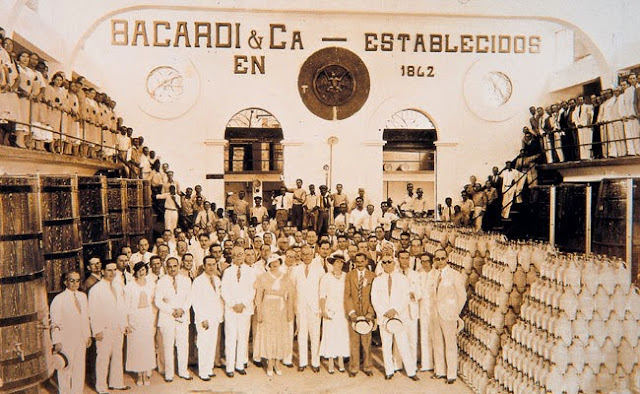Bourbon
What is it?
Bourbon whiskey is America's native spirit. In order to begin to fully appreciate bourbon, its important to know the regulations concerning it manufacture and how they relate to the end product in your glass. Here are the regulations regarding bourbon whiskey and why they matter to you, the consumer.
Bourbon must be made from at least 51% corn mash. Corn contributes a noticeable sweetness to the final product, and often makes up a much larger percentage of the mash bill in a bourbon whiskey. Other grains used to round out the mash bill include rye, barley and wheat.
Bourbon must be a product of the United States. Some people think that bourbon can only be produced in Kentucky, but that is erroneous. While the vast majority of bourbon is made in Kentucky, any state in the U.S. can produce bourbon. Washington State is eagerly anticipating the upcoming release of Dry Fly bourbon, and Finger Lakes Distilling makes bourbon in New York state to name a few notable non-Kentucky bourbons.
Bourbon must be distilled at no higher than 160 proof (80% abv). By keeping the distillation proof low, more congeners are allowed to stay in the final product, which results in more complex flavours.
Bourbon must be stored at no more than 125 proof (62.5% abv) in new American oak barrels.
Note that this means that water is added along with the white dog whiskey from the still to meet this requirement. This further opens up the bourbon and allows the barrel flavours to enhance the final product.
Bourbon must be bottled at no less than 80 proof (40% abv), with nothing added except pure water. Bringing a bourbon to the proper proof for maximum enjoyment is one of the Master Distillers tasks. Some bourbons are enjoyable at cask strength, while others need to be brought down in proof to maximize their potential.
A quick note on ageing bourbon in barrels. While the regulations require bourbon to be aged in new American oak barrels, nothing is said about how long bourbon must be aged in barrel.
An unscrupulous distiller could age bourbon for 1 day in cask and legally call it bourbon. Luckily, any bourbon aged less than two years must state how long it was aged on it label. If you see the term straight bourbon, it indicates that the bourbon in the bottle was aged at least 2 years in new American oak barrels.
Finally, bottled-in-bond offerings are the product of 1 distillery during 1 distilling season and have to be aged a minimum of 4 years and bottled at a minimum of 100 proof (50%abv).
Top 5 Bourbons in the World
PAPPY VAN WINKLE FAMILY RESERVE
Van Winkle
This is the #1 Rated Bourbon Whiskey in the World
The 'Pappy Van Winkle's Family Reserve' is aged an unheard of 20 years, and bottled at 90.4 proof. This whiskey is wonderfully smooth and rich. No other bourbon today can stand 20 years of ageing, but this bourbon does it with style.
ELIJAH CRAIG 12 YEARS OLD, 47%
ELIJAH CRAIG 12 YEARS OLD, 47%
DESCRIPTION: Perfume and clover honey fill the nose. This is deep and rich in structure. Well-integrated elements combine with a high alcohol feel. Still perfumed at the end. Best served neat
BLANTON'S SINGLE-BARREL BOURBON
Blanton’s Single Barrel Bourbon is expertly crafted in a unique time-honoured tradition. Blanton’s was the first Single Barrel Bourbon, setting the standard for others to follow. It is aged in one barrel, and unlike most others, never blended with any other bourbon.
BOOKER'S BOURBON, 63.2%
In 1988, Booker Noe introduced his own signature bourbon, Booker's True Barrel Bourbon. Inspired by a 200 year-old tradition, Master Distiller Emeritus Booker Noe, grandson of Jim Beam, created his very own bourbon. Unlike anything you have ever tasted, Booker's is the only bourbon bottled straight-from-the-barrel -- uncut and unfiltered -- a true connoisseur's sipping bourbon
MAKER'S MARK BOURBON, 45%
 Heaven Hill
Heaven HillNose: "Apricots, toffee and sandalwood. Fresh and minty." Grant Rampage
Palate: "Sweet toffee, roasted coffee beans, nuttiness." Martine Nouet
Finish: "Long-lasting richness and sweetness. Spicy finish." David Stewart
Five Things You Should Know About
WHISKEY VS. BOURBON
1.All bourbon is whiskey but not all whiskey is bourbon. Tennessee whiskey? Not bourbon. Canadian whiskey? Nope. Scotch? Definitely not bourbon... you get the idea.
2.Bourbon is all-American. In 1964, under President Lyndon Johnson's administration, Congress declared bourbon America's Native Spirit (LBJ sure enjoyed his bourbon.).
3.The only thing that can be added to bourbon is water (and only to bring it down to proof). Other whiskey makers can add colours and flavours to their products.
4.Whiskey can age in re-used barrels. By law bourbon must use NEW charred American white oak barrels. Scotch whiskey often recycles barrels first used for bourbon. Probably to try to steal some of the bourbon's flavour!
5.It can't say "bourbon" on the label if it's not distilled in the United States. And it can't be "Kentucky Bourbon" unless it's distilled in Kentucky.









Comments
Post a Comment